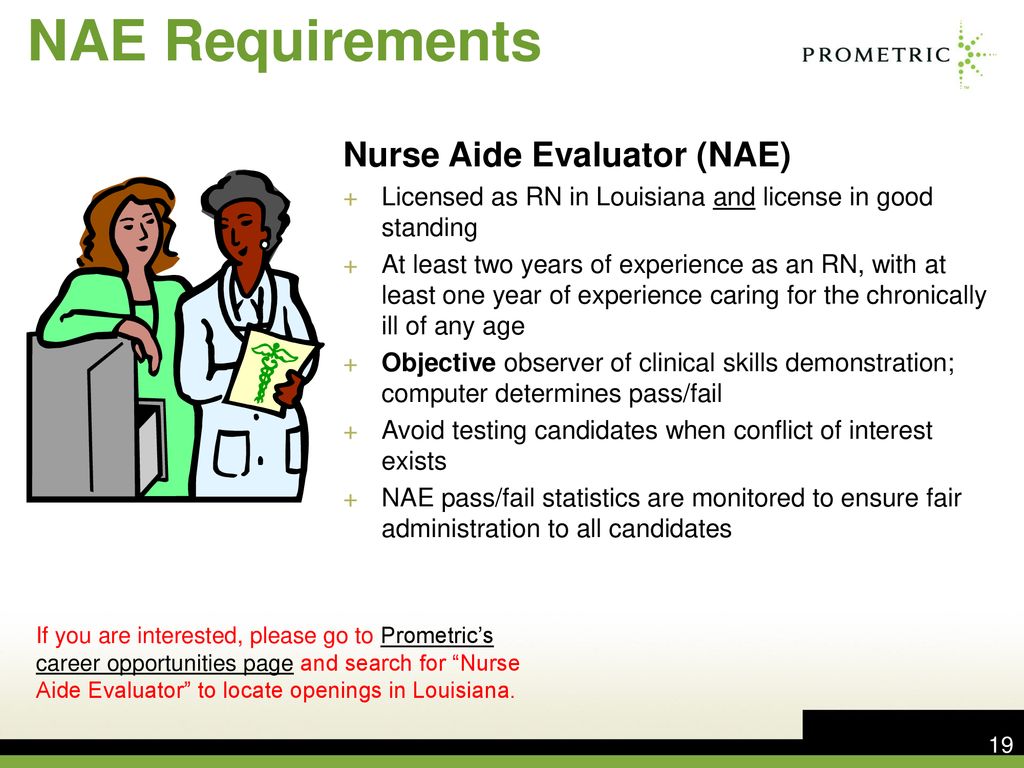To become a Nurse Aide Evaluator, acquire a nursing background and complete an evaluator training program. Gain experience in long-term care settings and obtain evaluators’ licensing if required by the state.
Nurse Aide Evaluators play a crucial role in the healthcare industry by assessing the competencies of Nurse Aides, ensuring they provide top-notch care to patients. Embarking on this career path requires a solid foundation in nursing, often needing a registered nurse (RN) license.
A solid understanding of state regulations and guidelines related to nurse aide training and evaluation is essential. After meeting the initial nursing qualifications, aspiring evaluators must typically undergo specific evaluator training that prepares them for this distinct role. Nurse Aide Evaluators must demonstrate excellent communication skills, a detail-oriented mindset, and a commitment to the ethical standards of the nursing profession to excel in their duties.

Credit: slideplayer.com
Understanding The Role Of A Nurse Aide Evaluator
A Nurse Aide Evaluator plays a crucial part in healthcare. This professional assesses nurse aides to ensure they can provide proper care. Evaluators maintain high standards in nursing by evaluating aide’s skills and knowledge. A strong evaluator has key skills like attention to detail and excellent communication. They also need to be objective and impartial. Strong evaluators help keep patients safe by making sure aides are ready to work.
Being successful in this role requires specific qualities. Evaluators must be patient, understanding, and knowledgeable. They should have good judgment and the ability to remain calm under pressure. These traits are vital for the job. They ensure a well-run evaluation process, which is critical for high-quality patient care.
Educational And Certification Requirements
To become a Nurse Aide Evaluator, a solid educational foundation is essential. Candidates must possess at least a high school diploma or its equivalent. Preferably, they should hold a nursing degree from an accredited institution. These academic qualifications ensure a deep understanding of healthcare practices.
Prospective evaluators must pass a certification exam. This exam tests their knowledge in healthcare provision and evaluation skills. The certification process varies depending on the state. It is a critical step to establish credibility and expertise in the field.
Certified Nurse Aide Evaluators are required to keep their credentials current. This often involves completing continuing education units and re-taking certification exams periodically. Each state has different rules for certification renewal, which must be followed carefully to maintain professional status.
The Path To Becoming A Nurse Aide Evaluator
Gaining experience as a nurse aide is crucial. Work in various healthcare settings. Aim to understand diverse patient needs. Experience shapes skills and competence.
Advancing to a nurse aide evaluator role requires additional steps. Seek out leading roles or supervisory positions. These help in developing necessary evaluation skills.
Understanding state-specific regulations and compliance is essential. Each state has unique certification processes. Familiarize yourself with these. Adherence to regulations ensures credibility.
Continuing education is important. It keeps evaluators updated on best practices. Professional development is ongoing. Attend workshops and seminars. Stay informed on industry changes.

Credit: credentia.com
Navigating The Job Market And Career Advancement
To become a Nurse Aide Evaluator, one must actively seek opportunities in the healthcare sector. Employers often value candidates with proven credentials and a history of quality patient care. Job boards, medical institutions, and training providers often list openings.
Building a strong professional network is crucial. Joining relevant associations and groups can lead to direct job recommendations. Engage with peers and supervisors to keep informed about new roles.
Career advancement may include specialization or administrative roles. With experience, some pursue educational or quality assurance positions. Continuous learning and skill development are key.
Navigating challenges requires resilience and adaptability. Seek mentors, follow industry trends, and develop strategies for dealing with workplace complexities. Success comes to those prepared for diverse situations.

Credit: medicalhero.com
Frequently Asked Questions Of How To Become A Nurse Aide Evaluator
What Cna Jobs Pay The Most?
Certified Nursing Assistant (CNA) jobs that pay the most typically include working in metropolitan hospitals, federal agencies, or for private in-home care clients. Specialized CNAs in intensive care or surgical units may also earn higher wages.
How Much Does A Nurse Aide Evaluator Make In Colorado?
A nurse aide evaluator in Colorado typically earns an average salary of approximately $38,000 per year. This figure can vary based on experience and specific location within the state.
What Do You Need To Be A Cna Instructor In Texas?
To become a CNA instructor in Texas, you must be a licensed nurse with two years’ nursing experience. One year must involve caring for the elderly or chronically ill in the last five years. Completion of a train-the-trainer course is also necessary.
How Much Does A Certified Nurse Aide Make In Texas?
A certified nurse aide (CNA) in Texas typically earns an average salary of about $27,000 to $32,000 per year.
Conclusion
Embarking on the journey to become a Nurse Aide Evaluator is a noble pursuit. It requires dedication, a sturdy grasp of medical knowledge, and a passion for healthcare excellence. As you move forward, keep in mind the significance of certification and continual learning.
Embrace the opportunity to uplift future nurse aides, ensuring the high standards of patient care are maintained. Your role is pivotal, shaping the caregivers of tomorrow. Start your path today and make a difference in the healthcare community.
